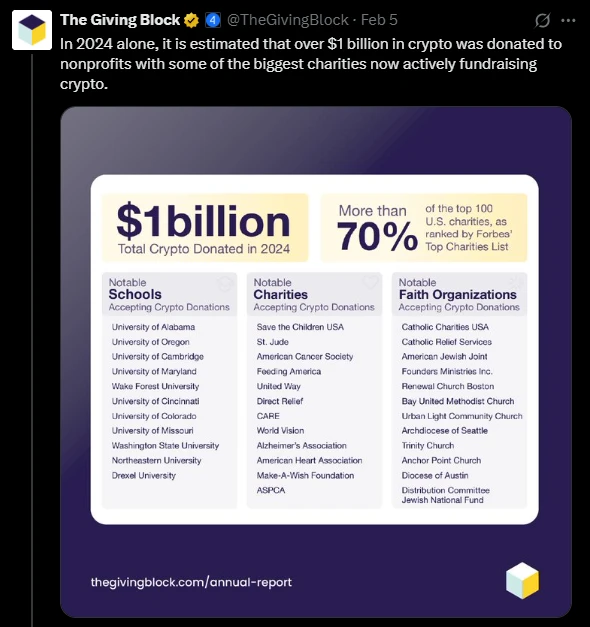TLDR
- Over $1 billion worth of crypto was donated to charitable causes in 2024.
- Most recently, Binance founder CZ sent $600k for earthquake relief in Asia.
- Ethereum founder Vitalik Buterin is also known for his contributions over the years, donating billions of dollars for everything from Covid relief funds to medical research.
Sometimes, crypto and the communities built around it touch our hearts. We reported on one meme coin that did just that a few months ago.
Cryptocurrencies have come a long way from being labeled as “Internet Money Thingys”. Today, they’re not just vehicles for financial speculation or tech savviness but tools with real-world impact. And one area where crypto is making waves? Philanthropy.
With over $1 billion in cryptocurrency donated to nonprofits in 2024, crypto-based giving has officially become a significant use case in its own right. The question isn’t whether crypto and philanthropy are a good match. The question is, how big can this get?
Let’s get after it.
Crypto Philanthropy by the Numbers
The Giving Block’s 2025 Annual Report on Crypto Philanthropy paints an inspiring picture. While news cycles centered on AI breakthroughs and electoral drama, crypto donations quietly broke records in 2024.
Here are the stats you need to know:
- $1 billion in crypto donations occurred in 2024 alone, marking an all-time high for digital giving.
- 64% of donations came via Bitcoin, reclaiming its crown from Ethereum and USDC in prior years.
- Nonprofit acceptance of crypto hit new heights, with growing adoption across charities around the globe.

Why Philanthropy and Crypto Align
The integration of cryptocurrency with philanthropy proves that the tech is capable of solving real-world problems that nonprofits face. More than that, it shows that it can help with real-world problems that we all face. Let’s break it down.
1. Borderless Giving
Crypto transcends borders. Donors don’t have to deal with expensive conversion fees, lengthy bank transfers, or inaccessible payment systems that plague certain regions.
For organizations like the Red Cross operating in disaster-stricken Myanmar or Thailand, receiving immediate donations in Bitcoin or Ethereum can mean life-saving action in hours instead of days.
Changpeng Zhao, Binance’s co-founder, proved this recently by donating $600,000 to earthquake relief efforts directly in BNB tokens. No SWIFT codes. No middlemen. Just immediate impact.
2. Transparency
Blockchain is built on transparency. Every transaction is recorded on a public ledger, meaning donors (and nonprofits) can track funds with unmatched accountability. The best part? The world gets to see it, too.
Who doesn’t love receipts? God bless blockchain tech. Proof that CZ is a man of his word, recorded on a public ledger. If the non-prof shares information, then people will also be able to see how the funds are used.
Compare this level of clarity to opaque traditional donation processes, which often leave donors wondering if their contributions got lost in overhead costs.
3. New Audiences
Crypto investors are a unique donor demographic. Many of them are digitally savvy, drawn to high-growth investments, and passionate about decentralization. These traits make them more likely to explore emerging giving avenues like crypto philanthropy.
Nonprofit organizations that accept crypto often report more millennial and Gen Z engagement, introducing fresh audiences to causes they care about.
Vitalik Won’t Be Outdone
Vitalik Buterin, the founder of Ethereum, is also known for his charitable efforts.
A few highlights include $1 billion to Covid relief efforts in India and nearly $10 million to the University of Maryland for medical research.
If you’re a crypto investor or new to blockchain, you’re part of a movement redefining how we give back. You have the opportunity to turn digital profits into real-world change, favoring immediacy, transparency, and global inclusivity.
Crypto isn’t just disrupting finance anymore. It’s rethinking how we approach problems on a global scale — from disaster relief to education funding.
Are You Part of the Future of Giving?
Whether it’s Bitcoin donations funding clean water or Ethereum supporting refugee aid, philanthropy is shaping up to be one of crypto’s most practical applications.
If you’re already investing in blockchain or exploring crypto for its financial benefits, why not consider its value beyond profit margins?
After all, the true power of an emerging technology isn’t how it disrupts industries but how it improves lives. That starts with users like us. Like you. Like everyone involved. This is one way we can all make crypto matter for the whole world.












